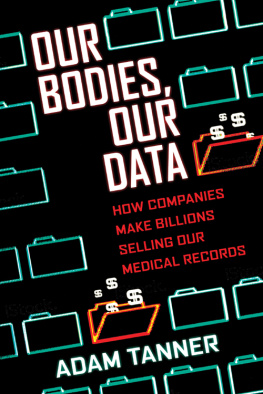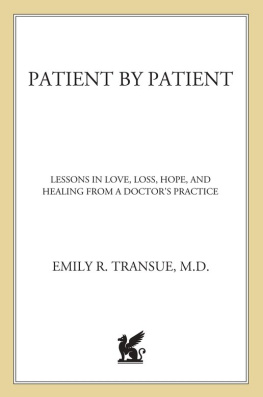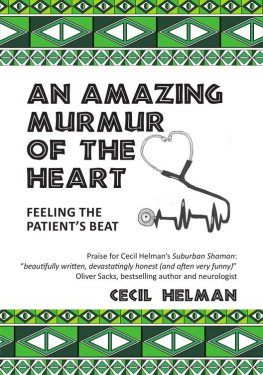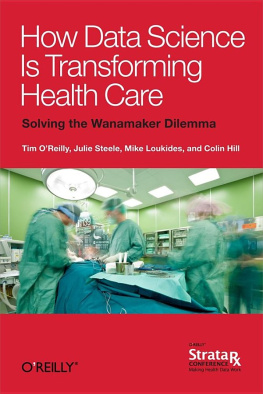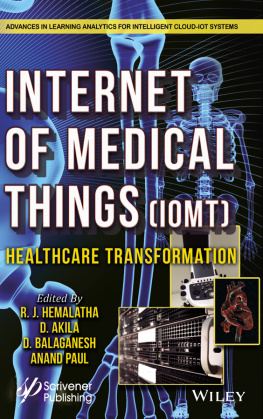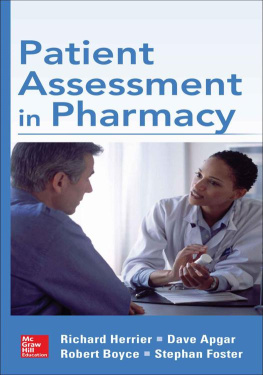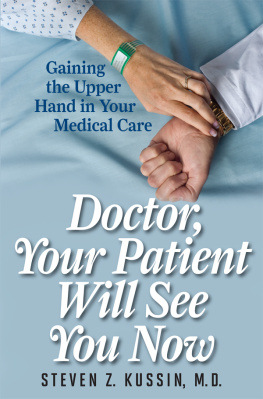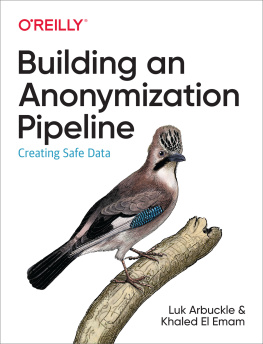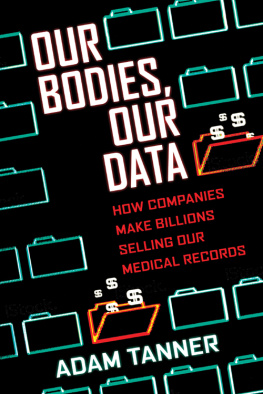
Beacon Press
Boston, Massachusetts
www.beacon.org
Beacon Press books
are published under the auspices of
the Unitarian Universalist Association of Congregations.
2017 by Adam Tanner
All rights reserved
Text design and composition by Kim Arney
Cover design: Louis Roe
Cover art: Image courtesy of iStockphoto
Author photograph: Celia Graham
The Library of Congress has cataloged the printed edition as follows:
Names: Tanner, Adam, author.
Title: Our bodies, our data : how companies make billions
selling our medical records / Adam Tanner.
Description: Boston : Beacon Press, [2016] |
Includes bibliographical references and index.
Identifiers: LCCN 2016016233 (print) | LCCN 2016017139 (ebook) |
ISBN 9780807033340 (hardcover : alk. paper) | ISBN 9780807033357 (ebook)
Subjects: | MESH: Electronic Health Records | Confidentiality | Data Mining
Classification: LCC R858 (print) | LCC R858 (ebook) | NLM WX 175 |
DDC 610.285dc23
LC record available at https://lccn.loc.gov/2016016233
To my parents, who, each in their own way,
inspired me to become a writer and to explore
the worlds unanswered questions

INTRODUCTION
S OON AFTER YOU tell your doctor about an intimate medical problem, data about your condition are sold commercially to companies that have nothing to do with your treatment or billing. The electronic medical record company may sell information about your embarrassing problem that the physician logs into the computer. The lab performing the blood test often sells a copy of the results. The pharmacy receives money for sharing the details of your prescribed medications, as does the insurer covering the cost of your treatment. Middlemen companies connecting pharmacies, doctors, hospitals, and insurance providers receive cash for sharing details about your health conditions. Such digitized details may only be worth a few pennies per transaction, but when repeated billions of times, they become not only big data, but also big business.
For-profit health care data mining companies buy information from all of these sources to assemble a detailed history about you and hundreds of millions of others. Their dossiers omit your name and contact details but list age, gender, and partial ZIP code. Those trafficking in anonymized medical records say their activities will fuel new, important research on vast populations of patients. Privacy advocates say this hidden trade will undermine trust in the health-care system and lead to discrimination and embarrassment.
Paradoxically, the digitization of medical data may not help when we need it most. Imagine that a man collapses during an out-of-town trip. The ambulance team arrives, opens his wallet, and finds a link to his electronic medical records. They call the health record bank and verify that he has authorized the emergency release of information. The team reviews the details and sends a copy to the emergency room physician. The file warns about potential clashes with existing medications and offers insights into the patients condition. In an era when a few mouse clicks can retrieve obscure documents, such easy access to medical records might seem unexceptional. Yet, for the most part, this scenario remains a hope for the future rather than a present-day reality. Even half a century after pioneers started digitizing health records, a hodgepodge of different systems and providers vexes an individuals ability to assemble a complete medical dossier.
Many people realize that companies we interact with every day, whether that company is Google, Facebook, or Amazon, gather details as we go about our lives. They note what we buy, where we go, what we eat, how we search the Internet, and what we read and watch. Few people realize that a sophisticated system of medical data gathering has evolved into a multibillion-dollar business, constructed from details few of us would share willingly with outside companies. Its not only ordinary folks who remain in the dark about these practices. Ive met deans of top US medical schools and public health programs, doctors, pharmacists, and nurses who have no idea how vast this trade has become. A 2014 White House report explained the business in rather understated language: Personal health information of various kinds is shared with an array of firms, and even sold by state governments, in ways that might not accord with consumer expectations of the privacy of their medical data.
Imagine if priests and pastors, accountants and lawyers all sold anonymized notes about their confidential conversations with parishioners and clients. The aggregated results might provide fascinating insights about what type of people are most likely to sin, cheat on their taxes, or proclaim innocence when guilty of a crime. The insights could prove valuable to moral leaders, tax collectors, and law enforcement. Its easy to imagine the outcry that might ensue if such sales actually took place, for such sharing would undermine the trust essential to those professions. But similar sharingwhich US law allows for anonymized medical dataoccurs millions of times of day across our health-care system.
In recent years, businesses and researchers have heralded the great promise of big data, the staggering quantity of complex, digitalized information that unprecedented computing power can store and analyze. Yet for all the hype, a surge of health-care breakthroughs has yet to arrive. Asked to name the most dramatic discovery resulting from aggregating hundreds of millions of patient histories known as longitudinal data, company executives who trade such information often speak of efficiencies and interesting insights rather than bold breakthroughs. The reality is that data-driven benefits for health care have still not materially showed up, said Kris Joshi, executive vice president at health-data company Emdeon. Health care is generating a very, very pitifully small amount of value, given the amount of data there.
The evidence so far suggests that companies I refer to as medical data miners have oversold the scientific benefits of their for-profit trade, at least in terms of what has emerged to date. Joshi emphasized that for all of big datas scientific promise, companies typically use this vast trove of information for mundane commercial purposes: It is being used to market drugs, for example, and it is being used to figure out which doctors prescribe what drugs. Such results raise the question of whether there might be a better way to harness the promise of big data in medicine.
I have spent years researching the dramatic increase in corporate data gathering that takes place without our knowledge or active consent. My previous book, What Stays in Vegas: The World of Personal DataLifeblood of Big Businessand the End of Privacy as We Know It, recounts how smart, well-intentioned executives across many industries have made the continuous acquisition of information about all of us a central focus of their businesses. Sometimes such practices benefit consumers; often they do not. As in other sectors of the growing data economy, many good, idealistic people are involved in the trade of medical information. Yet nowhere is the potential for negative consequences greater, from the denial of life insurance to medical identity theft, from job rejection to blackmail. Actor Charlie Sheen illustrated the power of medical data to do harm when in 2015 he revealed that he had paid millions of dollars in blackmail money to keep his HIV-positive status secret. As computing grows more powerful, ordinary folks also face greater risks as commercial patient dossiers become increasingly vulnerable to re-identification. This means that even after a name, an address, and other direct links to a persons identity are removeda process called

